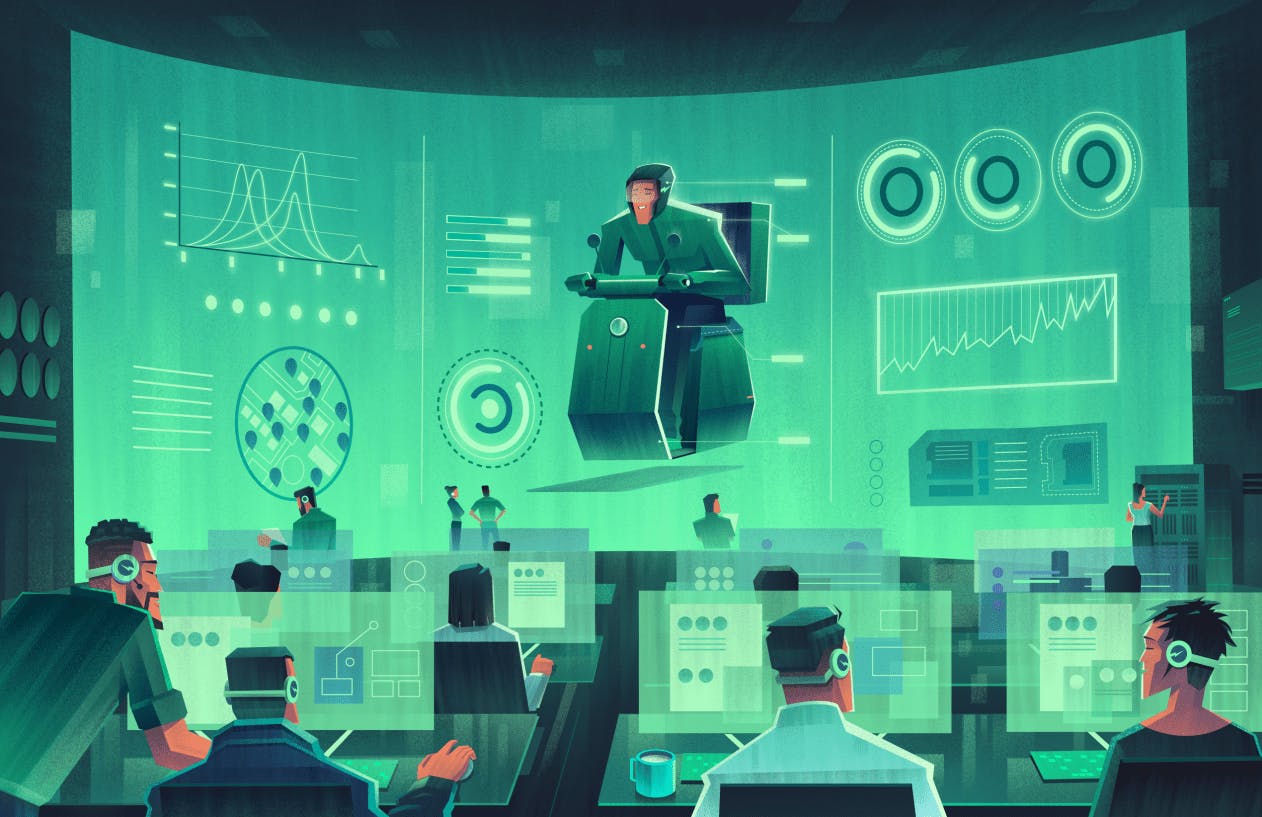In today's fast-paced business world, efficiency is key to success. With limited resources and increasing competition, companies are constantly looking for ways to streamline their processes and increase productivity. One of the most exciting and revolutionary ways businesses can boost their efficiency is through the use of Artificial Intelligence (AI). The applications of AI in business have the potential to transform the way companies operate, making them more efficient, productive and profitable.
Thesis statement: AI applications in business can significantly improve business processes and increase efficiency, making it a vital tool for companies to stay ahead in the competitive market.
Intelligent Automation
Transforming Business Processes
AI-powered intelligent automation is a technology that combines robotic process automation (RPA) with cognitive computing and machine learning abilities. It enables businesses to automate repetitive and time-consuming tasks, freeing up employees to focus on more strategic and high-value activities. By allowing AI to handle mundane tasks like data entry, document processing and customer support, businesses can achieve faster and more accurate results, leading to increased efficiency.
Cognitive Computing
Enhancing Decision-Making
Cognitive computing, also known as augmented intelligence, is another significant application of AI in business. It involves the use of machine learning algorithms to analyze vast amounts of data and assist in decision-making processes. By leveraging AI technology, businesses can receive valuable insights and forecasts, enabling them to make data-driven decisions in real time. This can result in reduced costs, optimized operations and increased efficiency.

Artwork by Danny Jose
How can AI be used to improve business processes and increase efficiency?
AI can be used in various ways to improve business processes and increase efficiency. Apart from intelligent automation and cognitive computing, AI-powered chatbots can handle customer inquiries, reducing the burden on customer service teams. Virtual personal assistants can assist with scheduling appointments, managing emails and organizing tasks, saving time and effort for employees.
AI can also be used for predictive maintenance, where machines can detect when they require repairs or maintenance, avoiding costly downtime. Overall, by automating tasks and assisting with decision-making, AI can significantly improve business processes and increase efficiency.
Are there any specific industries or business functions that can benefit the most from AI applications?
The potential of AI in business is vast and it can benefit almost every industry and business function. For example, in the healthcare industry, AI can assist in diagnosing diseases and predicting potential health risks. In the financial sector, AI can help with fraud detection, risk assessment and portfolio management. In the retail industry, AI can enhance customer experience through personalized recommendations and targeted advertising. The possibilities of AI are endless and businesses in all industries can benefit from its applications.
What are some common challenges or barriers to implementing AI in a business setting?
One of the main challenges businesses face when implementing AI is the lack of skilled professionals. As AI is a relatively new and specialized field, there is a shortage of trained individuals who can develop and implement AI solutions. Another barrier is the fear of job displacement, as AI can automate jobs traditionally performed by humans. This can lead to resistance from employees and a negative perception from the public. Security and privacy concerns are also common barriers to implementing AI, as businesses need to ensure the ethical use and responsible deployment of AI technologies.

Artwork by Danny Jose
How can businesses ensure ethical use and responsible deployment of AI technologies in their operations?
To ensure ethical use and responsible deployment of AI technologies, businesses must establish clear guidelines and practices for handling AI-based systems. This includes providing transparent explanations of AI decision-making processes, ensuring data privacy and security, regularly monitoring and updating AI algorithms. Companies can also consider incorporating ethical principles into their AI development processes and involving stakeholders in decision-making. Additionally, partnering with trusted and reputable AI providers, such as Laetro, who value ethical and responsible AI deployment, can be beneficial for businesses.
Laetro: Your Trusted AI Partner
Laetro is a leading AI solutions provider that helps companies harness the power of AI to improve efficiency, cut costs and increase profitability. With their team of experienced AI professionals, Laetro offers a range of AI-based services, including intelligent automation, predictive maintenance, chatbots, and cognitive computing. They prioritize ethical and responsible AI deployment and work closely with businesses to develop tailored solutions that meet their specific needs and goals. Laetro's expertise and cutting-edge technology make them the ideal partner for businesses looking to leverage AI and boost efficiency.
In conclusion, the applications of AI in business have the potential to revolutionize how companies operate, making them more efficient, productive and successful. By adopting AI-powered intelligent automation and cognitive computing, businesses can automate tasks, enhance decision-making and improve overall efficiency. While there may be challenges and barriers to implementing AI, companies can overcome them by partnering with trusted providers like Laetro and prioritizing ethical and responsible deployment of AI technologies.
To summarize, here are the key points discussed in this article:
- AI-powered intelligent automation can automate tasks and increase efficiency.
- Cognitive computing can assist in decision-making and improve operations.
- AI can be used in various industries and business functions.
- Challenges in implementing AI include the lack of skilled professionals and fear of job displacement.
- Businesses can ensure ethical use and responsible deployment of AI by establishing guidelines, involving stakeholders and partnering with trusted providers like Laetro.

